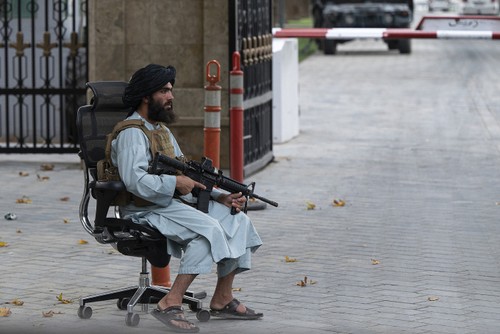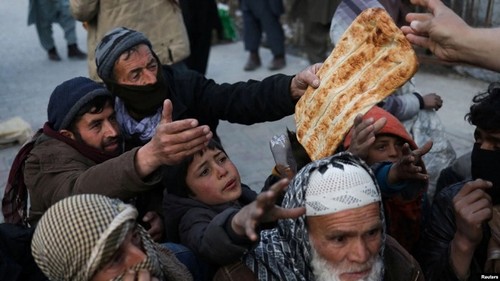 A Taliban fighter guards the presidential palace in Kabul on August 13, 2022. (Photo: AFP) A Taliban fighter guards the presidential palace in Kabul on August 13, 2022. (Photo: AFP) |
Empty public coffers and a growing humanitarian crisis are threatening the lives of millions of Afghans.
Severe difficulties
In a letter to US President Joe Biden and the US Treasury Secretary, 71 economists and international development experts expressed their deep concern about the financial and humanitarian crisis in Afghanistan. Joseph Stiglitz, a Nobel laureate in economics and Yanis Varoufakis, former Greek Finance Minister, said plummeting economic activity and decreased foreign aid since the US withdrawal have pushed the Afghan economy into a crisis. 70% of Afghan households cannot meet their basic needs. 22.8 million people (more than half the population) face serious food insecurity. Three million children are at risk of malnutrition.
Multiple organizations have released alarming data on Afghanistan’s food in security. German Foreign Minister Annalena Baerbock called the situation in Afghanistan “the worst humanitarian catastrophe of our time”.
Reports say the fundamental cause of the situation is a significant decrease in foreign aid for Afghanistan since the Taliban took power. The Taliban has a very limited capacity to manage Afghanistan and its economy. What the Taliban has done is impose harsh restrictions under Islamic Sharia law, especially on women, which has further reduced production.
 About 95% of the Afghan population are not getting enough to eat every day. (Photo: Reuters) About 95% of the Afghan population are not getting enough to eat every day. (Photo: Reuters) |
International efforts are needed
Experts say that the current context is quite unfavorable for increasing international aid to Afghanistan. Most major economies are focusing their resources on domestic economic difficulties due to the COVID-19 pandemic and the Russia-Ukraine conflict. And the Taliban's imposition of Sharia law has discouraged all investment in Afghanistan.
On Monday the International Committee of the Red Cross (ICRC) urged governments and donors to put aside their attitude toward the Taliban and resume aid to Afghan agencies to address the humanitarian crisis.
The ICRC is one of very few international organizations that have continued to send humanitarian aid to Afghanistan since the Taliban took control. It has helped 33 hospitals maintain operations, pay staff salaries, fuel their ambulances, and feed their patients. But ICRC Director General Robert Mardini said it’s not a sustainable solution because humanitarian organizations cannot replace state agencies. It urges governments and development agencies to resume their aid to the Afghan people.
Activists have called on the US and the EU to unfreeze 9 billion USD that was frozen after the Taliban came to power. They say the money is needed to save Afghanistan’s financial system from collapse and avoid an economic and humanitarian disaster.